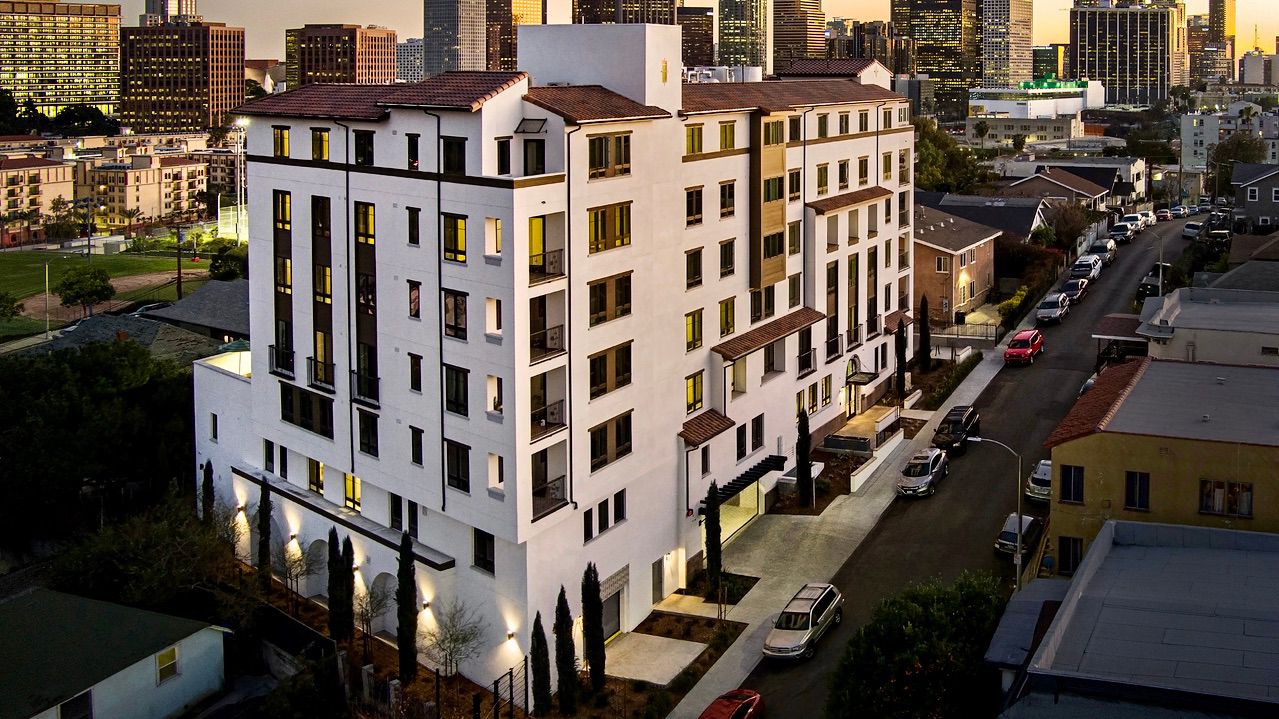LOS ANGELES — When Ted Handel drives by or looks up at Firmin Court, he doesn’t just see an affordable housing project near Downtown Los Angeles.
He sees a growing and functional community for the city’s neediest residents.
The seven-story Spanish Mediterranean-style building built to house over 60 chronically homeless, homeless and low-income households feature on-site social services from St. Joseph Center, where residents can learn independent living skills, receive mental and behavior counseling, or seek employment educational assistance.
Inside, a sky deck overlooks downtown LA’s skyline, a community room with a kitchen, and a learning center, where children living in the building and the neighborhood could do homework and study in a safe and secure space.
“That’s the Decro ethic. We want to be able to give back to the community that we’re helping and make resources available,” said Handel, the CEO of Decro Corp., to Spectrum News.
Decro is a nonprofit housing developer based in Culver City.
Decro and Santa Ana-based affordable housing developer Innovative Housing Opportunities have co-developed the 64-unit project at 424 Firmin Street in Los Angeles.
The estimated $35 million to $40 million project is one of the first affordable housing projects financed by Los Angeles’ Proposition HHH.
The proposition, passed in Nov. 2016, allows the city to issue $1.2 billion to fund supportive and affordable housing for homeless and chronically homeless people and mental health care and addiction treatment services.
But since passing HHH, Los Angeles has not seen any meaningful progress to help house the over 41,000 homeless people living on the streets.
According to the controller’s office, 95% or $1.1 billion in HHH money has been set aside to develop supportive and affordable housing, but few of the 125 projects totaling 8,091 units have come online.
As of Dec. 2021, the latest numbers released by the city, only 14% of units are ready for occupancy; 54% are in construction, and 32% are in pre-development.
The Feb. 2022 controller's report said those in the construction pipeline face staggering delays and rising per-unit costs.
“Over the last two years, the pandemic has exacerbated the situation, spurring new policy initiatives and greater desire to make HHH more impactful,” wrote former Los Angeles City Controller Ron Galperin. “Nevertheless, HHH is still unable to meet the demands of the homelessness crisis.”
“It was the perfect storm of staffing shortages, material shortages, and cost overrun,” said Rochelle Mills, the president of IHO, the co-developer of Firmin Court. “We’re fortunate to have completed the project. Many of us [affordable housing developers] couldn’t make it to the finish line.”
Firmin Court had to overcome a list of obstacles before completion. The city had designated one of the two original homes, built in the late 1800s, as historical, so it had to be relocated and preserved, said Handel.
Handel said the project site also sat on top of an oil well that had to be abandoned and capped.
“We are in compliance with all state and local requirements,” said Handel regarding handling the former oil well.
For Handel, seeing the finished product of Firmin Court was well worth the difficulties. He said he and his team and IHO did a great job persevering to help house the neediest population.
“This is an issue of people and human beings and treating them with dignity and respect,” he said.
Forty-eight of the 63 units are occupied. The city’s housing department identifies and qualifies individuals or families for the other units.
During Thursday’s grand opening, two new residents spoke about how much the home meant to them.
Handel nearly got emotional listening to their stories. One resident spoke about what it was like living on the streets. The other talked about how he was gainfully employed before his “life fell into shambles.”
Seeing them having a home in Firmin Court is gratifying, said Handel.
“We’re not just opening a building,” he said. “The journey doesn’t end when the building is complete. This is one of the highest expressions of serving humanity. We are housing people. We’re giving them keys to a door of opportunity. When they open that door, it opens to a community that will be enriching, supportive, and safe.”
